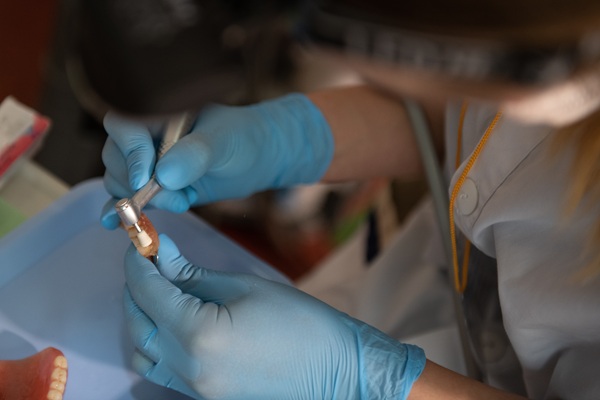Signs You May Need a Root Canal

Does your mouth hurt? Are you experiencing discomfort or swelling indicating a possible tooth issue? Below are some symptoms that can help your dentist diagnose your dental issue and determine the best option for treatment.
PAIN SYMPTOMS
You may be experiencing varying levels of pain and discomfort that can indicate the need for a
root canal, such as:
- Level of discomfort that may vary from slight to extreme, sometimes accompanied by a pulsing or throbbing sensation in the gum tissue.
- Pain that may lessen or intensify when you move around and change position, such as standing up and bending over.
- Sensitivity to exposure to hot or cold foods and beverages.
- Tooth pain that lingers for a while, from a few minutes to a few hours, before finally fading and returning at another time.
- Pain or discomfort that prevents you from sleeping well or at all.
In addition to pain, you may also experience symptoms like:
- Gum tissue is tender
- Swelling and tenderness at the tip of the problem tooth’s root
- Infected tooth feels slightly taller or elevated compared to other teeth
- Swelling in jaw, face or neck
- Pronounced gum swelling, resembling a pimple or “gumboil”
The frequency of pain and/or swelling may be transient or persistent. However, not every tooth infection causes swelling or inflammation of the gums. In fact, you may not know which tooth is the culprit.As your dentist, Dr. Garcia can perform a number of tests such as x-rays to determine the health of your gum tissues, nerves and the tooth that is causing you discomfort. The death of a tooth’s nerve isn’t always a painful event and sometimes may only have signs that are obvious to your dentist.Making a self-diagnosis is not recommended, but the signs and symptoms listed above may help you determine if the discomfort you are experiencing requires a professional opinion.
Dr. Garcia has been helping New Mexicans relieve their tooth pain for over 30 years. If you are experiencing any tooth or gum pain, don’t delay seeking treatment. Immediate attention will not only relieve you of the pain, but will also prevent further damage and infection.
Se habla Español.
Recent Posts
The thought of getting a root canal is, for many people, one of the scariest dental procedures possible. This treatment can cause a person to feel nervous and anxious. The truth is that your dentist will have the knowledge and training to successfully perform this treatment without you being in much pain. It is helpful…
A person may need a root canal to clean out the inside of their tooth and remove infection. However, not all infections present symptoms, and if they do, different people may experience them differently. For this reason, understanding whether you need a root canal can become tricky.While no two people are entirely alike, most will…
Hearing that you need a root canal may not be welcome news, but you can handle this procedure. Despite what you may have heard, there is minimal pain and discomfort during the process. Plus, the recovery period is usually quick. Along with cleaning out your tooth, you will likely get a crown over it. There…
Curious about the root canal process? This review discusses the specifics of what you can expect when visiting a dentist for root canal treatment. Read on to learn more about this type of restorative treatment.Every dentist has their own process for root canal treatment, but there is a general process that most follow with patients.…
 Does your mouth hurt? Are you experiencing discomfort or swelling indicating a possible tooth issue? Below are some symptoms that can help your dentist diagnose your dental issue and determine the best option for treatment.
Does your mouth hurt? Are you experiencing discomfort or swelling indicating a possible tooth issue? Below are some symptoms that can help your dentist diagnose your dental issue and determine the best option for treatment. 
